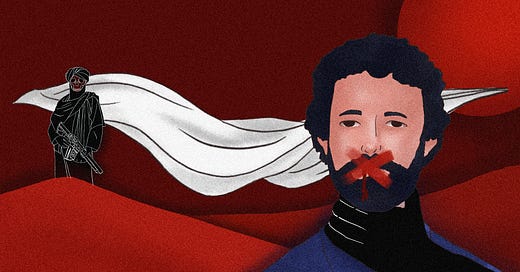A Nation Gagged
Afghanistan’s poets and journalists are increasingly persecuted under Taliban rule
When you hear about limitations on freedom of expression, what comes to mind? Is it the inability to criticize the government or speak out on certain issues in the media? In places like the United States, these concerns feel distant. Even amid debates about cancel culture or the so-called "woke" movement, most people in liberal democracies still have the privilege to voice their opinions, even when facing backlash. But in much of the world, the stakes are far higher. Criticism of authority can mean imprisonment, torture, or worse.
Consider Afghanistan, now under the control of the Taliban since their takeover in August 2021. The regime’s brutal crackdown on journalists, artists, and ordinary citizens is not a new phenomenon but rather a grim continuation of the country's long struggle with authoritarianism. Yet, under the Taliban, the repression has intensified to unprecedented levels. Freedom of expression, once a fragile but real possibility for many Afghans, has been almost entirely erased.
Afghanistan’s history has always been one of ideological conflict, and through these conflicts, poets, writers, and journalists have played crucial roles in shaping narratives of resistance and freedom. During the Soviet invasion, poets like Qahar Assi became symbols of defiance. Today, that resistance continues, but under far grimmer circumstances.
Take the case of Mr. Abdul*, a well-known writer and publisher based in Kabul. His office was shut down by the Taliban, accused of "corrupting the minds of the public" and spreading "propaganda against the Islamic regime." The very act of questioning the Taliban’s authority was deemed so dangerous that Abdul’s words, his poems, were enough to shake their fragile grip on power. Mr. Abdul received a micro-grant through Ideas Beyond Borders’ Innovation Hub program to cultivate art and education among the working street children in Kabul City. Due to years of war and chaos, many families rely on their children to provide for them. Most often, these kids are sent to work on the streets under troubling and disturbing conditions, doing hard labor. Mr. Abdul’s work promotes education and art for these children by providing them with the tools necessary to do so.
Abdul’s ordeal is not an isolated one. After performing a poem critical of the regime, he was detained, beaten, and tortured by the Taliban’s intelligence services. His crime? Writing. "I was initially beaten, tortured, and threatened with death... I was disrespected, and by the end, they said it was a misunderstanding," Abdul recalls. The so-called "misunderstanding" was his critique of the Taliban, an act that, in most parts of the world, would be considered a fundamental right.
"Freedom of speech? There is no freedom of speech. There is no such thing as freedom at all in Afghanistan right now," Abdul said after his release. His experience, though horrifying, is far from unique. Public beatings of young men for dressing "Western" or having what the Taliban calls a "Jewish haircut" are common. The oppression of women, while more widely reported, is only one part of the Taliban’s broader campaign of total societal control.
Yet, even in the face of such brutal oppression, there is defiance. Abdul, despite being traumatized and physically weakened by his imprisonment, remains committed to his cause. He continues to write under a pseudonym, determined that his words will outlast the regime that seeks to silence him. "Regimes of hatred cannot last forever," he says. "Afghans cannot be held under a dogmatic leash. It's in the DNA of every Afghan to fight back."
The persecution of free thinkers in Afghanistan is not just a local issue but a global one. The collapse of free speech in any country diminishes the world’s collective fight for human rights and democracy. As the Afghan journalist Shafi Karimi, who is currently living in exile himself, notes, "In a country where repression reigns, the role of journalists is more critical than ever. Yet, the shrinking space for free media in Afghanistan threatens not only the truth but the very foundation of a democratic society."
As liberal democracies around the world grapple with debates on free speech, it’s crucial to remember that for much of the planet’s population, freedom of expression isn’t about cancel culture or social media backlash. It’s about life and death. And nowhere is this more apparent than in Afghanistan. Ideas Beyond Borders and our partners exist to stand against this oppression through decisive and timely response measures, like supporting underground schools for women and supporting poets like Abdul in his pursuit of freedom. IBB is an action-oriented organization that relies on our international partners and donors to help us reach the people who can bring positive change in their communities by taking the initiative themselves—despite the risks.
*Ideas Beyond Borders uses pseudonyms to protect our partners in Afghanistan





